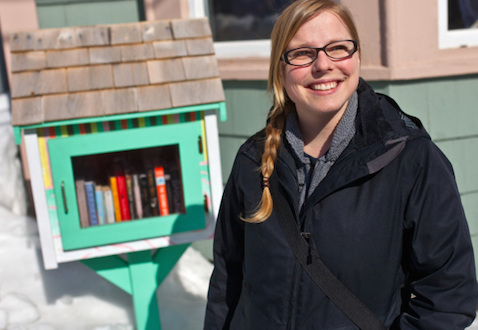 “If I won the lottery, I would be a student for the rest of my life,” says Alieda Blandford. About to graduate from the School of Information Management’s (SIM) Master of Library and Information Studies (MLIS) program, Blandford is passionate about absorbing information. As her activities these days show, she is also passionate about disseminating it.
“If I won the lottery, I would be a student for the rest of my life,” says Alieda Blandford. About to graduate from the School of Information Management’s (SIM) Master of Library and Information Studies (MLIS) program, Blandford is passionate about absorbing information. As her activities these days show, she is also passionate about disseminating it.
After completing an undergraduate degree in English at the University of Victoria, Blandford wanted to come to Halifax, and SIM appealed to her: “I liked that it’s in the Faculty of Management. It’s one of the things that brought me here over other schools in Canada.” Blandford’s MLIS courses spanned the history of the book to emerging technologies and digital information. “It’s so exciting to be a library student today because you see all this dynamic change,” she says. “In public libraries you see a lot more innovation.” Blandford was an active student, using her flair for information management to handle the online presence of the SIM Student Association. She also served as editorial chair of the Dalhousie Journal of Interdisciplinary Management, a student-run journal based in SIM. And last summer, a group of students that included Blandford began a new library project.
After classes ended, says Blandford, some classmates met over coffee and began discussing civic engagement and free access to information, a cause very important to her. “We were talking about how we could do something actionable, talk to people in some way and put across a message about access to information,” she recalls. The group decided to start a Little Free Library (LFL) in Halifax. The LFL movement is worldwide, explains Blandford. Groups and individuals build tiny structures in public spaces and stock them with books.
The Halifax group, now called FYI Halifax, approached the owners and residents of a home on Agricola Street who host community events, and asked if they could put their library in the front yard. They loved the idea. Blandford’s husband, a carpenter, built the LFL, and Blandford and her classmates, as well as a friend who works for Halifax Public Libraries, worked together to finish the library. It has prospered. “If I leave it for a couple of days, when I come back it will be full,” she says. “People take books and put books in, never the same books.” The group has fielded calls from businesses interested in donating and in having their own LFL. They are planning to install a second LFL on Gottingen Street and a third on Dalhousie campus.
Although FYI Halifax has so far initiated only LFLs, the group has other ideas, such as mapping Wi-Fi access points in Halifax and encouraging the city to set up more free access. “As a group, we’re interested in doing any project that speaks to the importance of free access to information,” says Blandford.
As for her own future, Blandford plans to continue helping others access information. “I want to get more library experience,” she says. “I would really like to do something with collection development and emerging technology.” Reflecting on why the LFL movement has been so successful, Blandford considers the role of librarians. “I guess it’s something that permeates the whole profession of librarianship which has a lot to do with community service and enriching your community,” she says. “It’s the importance that information has to people’s lives.”
Recent News
- MLIS alumna wins 2023 RBC/PEN Canada’s New Voices Award
- Job Postings: Part‑Time Academics (Fall 2023)
- Charlie Hook (MI ’23) on her upcoming PhD Program at the University of Leicester
- Alison Brown Featured in 2023 Dalhousie ‘Open Think’ Initiative
- Job Posting: Part‑Time Academics (Summer 2023)
- MLIS Graduate Chosen as 2023 Black Changemaker
- Dal SIM Appoints Two New Professors Emeriti
- Dr. Colin Conrad on his new role as Interim Director (Master of Digital Innovation)
